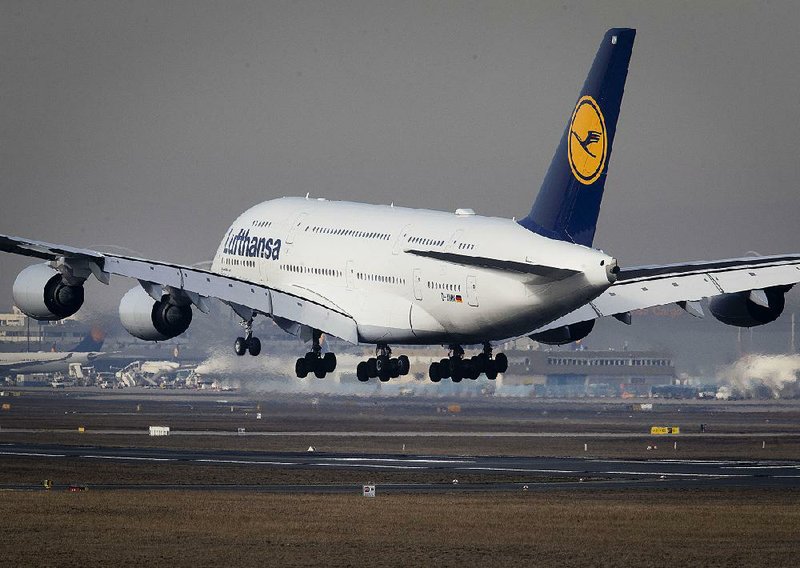TOULOUSE, France -- Airbus will cease production of its mammoth A380 passenger jet, an engineering marvel that nevertheless couldn't keep up with shifts in the way people fly, the European aircraft-maker said Thursday.
Citing reduced orders from Emirates Airline, a major customer, and an inability to find other buyers, the company said it would halt deliveries of the jumbo jetliner in 2021, although it said it would continue to support existing A380s.
"As a result of this decision we have no substantial A380 backlog and hence no basis to sustain production, despite all our sales efforts with other airlines in recent years," the company's chief executive, Tom Enders, said in a statement. "Today's announcement is painful for us and the A380 communities worldwide."
The decision will lead to job cuts at Airbus, potentially affecting as many as 3,500 of its 134,000 employees over the next three years. Airbus said it would start discussions in the next few weeks about the consequences for its workforce.
The announcement overshadowed the company's announcement on Thursday of its full-year results. Its net income rose 29 percent in 2018 to about $3.5 billion.
Development talks for the plane began in 2000, meant to be Airbus' 21st-century answer to rival Boeing's 1960s-era 747, and one of the most ambitious endeavors in aviation. Its four Rolls-Royce engines were quieter than ever, far out on the extra-long wings. Carbon-fiber technology was used for the body to make it lighter and easier to maneuver. Its double-decker construction allowed room for bars, duty-free shops and even showers.
From its inception, the A380 was a grand European project. The wings, like those of all Airbus aircraft, came from the U.K., and components were ferried across the continent from production sites in Germany and France. The giant fuselage tubes were taken by barge and flatbed truck to the main facility in Toulouse, and the planes were then painted and kitted out in Hamburg. Teams from across the region joined colleagues at other sites during crunch times, the bulbous Beluga freight planes would crisscross countries with parts, and the A380 was a popular backdrop at air shows for politicians celebrating Europe's achievements.
Airbus spent $25 billion developing the aircraft, which can carry more than 500 passengers. It was built for a time when crowded airports would demand that planes carry more people to reduce congestion.
But flight traffic instead shifted to smaller planes, which are cheaper to maintain, flying to regional airports, a move that reduced demand for larger aircraft.
Emirates, the Dubai-based airline, was Airbus' main customer for the jumbo jet, with a fleet of more than 100, but the airline has scaled back its plans and will take delivery of just 14 more over the next two years.
One of the jetliner's first test pilots took a philosophical view. While he's "feeling a bit sad" about the news, Claude Lelaie said the giant plane will be remembered for pushing the barriers of aviation, like the supersonic Concorde.
"Both made history and allowed progress, technological progress," he told The Associated Press from the southern French city of Toulouse, the cradle of Airbus' worldwide operations. "That's business -- you have to ensure the success of the company."
Lelaie was a co-pilot aboard the maiden flight of the superjumbo in 2005, 101 years after the Wright brothers' first flight.
Yet to detractors, the A380 smacked of hubris, a vanity project by managers who saw bigger as better despite an uncertain market for a plane so huge that airports had to modify their runways and gates.
It faced repeated production setbacks and cost overruns. Order cancellations led to a restructuring at Airbus that saw thousands of job cuts.
"The 380 may have just been too large of a step for the market to handle," said Rob Watts, CEO of aviation consulting company Aerotask.
The chairman and CEO of Emirates, Sheikh Ahmed bin Saeed al Maktoum, said: "While we are disappointed to have to give up our order, and sad that the program could not be sustained, we accept that this is the reality of the situation."
The fate of the superjumbo has been in question for at least a year, and Enders acknowledged in January 2018 that the company would not be able to continue production of the plane without an order from Emirates.
Airbus was thrown a lifeline with a $16 billion order from Emirates a few days later, but Airbus confirmed last month that it was in discussions about whether that deal would ever be realized. The A380 took another hit last week as Qantas canceled its order from 2006 for eight of the planes.
Emirates is not abandoning Airbus, however. The plane manufacturer said Thursday that the airline would emphasize two smaller models instead, the A330-900 and the A350-900.
Airbus was at pains to emphasize that A380s will not disappear anytime soon. "Keep in mind that A380s will still roam the skies for many years to come, and Airbus will of course continue to fully support the A380 operators," Enders said.
Information for this article was contributed by Amie Tsang of The New York Times, by Angela Charlton of The Associated Press and by Benjamin Katz and Benedikt Kammel of Bloomberg News.
Business on 02/15/2019
